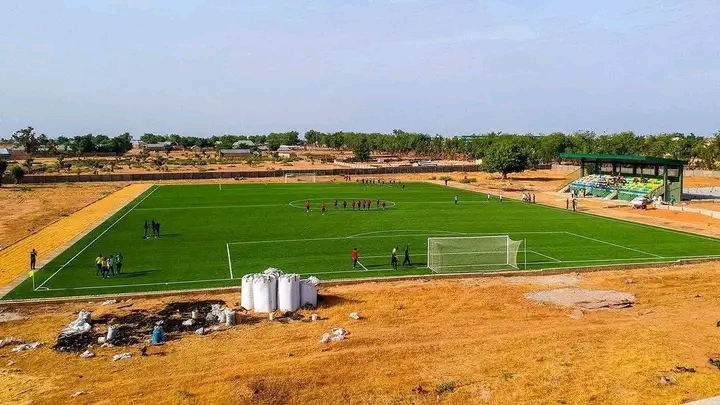Kebbi stadium: NFF caught up in fresh allegations of misuse of FIFA funds

A few weeks ago, former Super Eagles captain Sunday Oliseh made damning allegations.
Speaking on the Home Turf podcast, Oliseh accused the Nigeria Football Federation (NFF) of pocketing $1 million from FIFA.
He claimed the money was a reward for Nigeria’s qualification for the 2002 World Cup.
According to him, there was an agreement to split the money equally and share one half among the players.
But the NFF opted to disband the team and kept the money.
Oliseh said: “We qualified for the finals, and they disbanded the team. They made sure we did not get our share.
“The team that went to that World Cup, 80 percent of that team didn’t play in the qualifiers. That means they didn’t get the share of that money.”
This week, NFF’s handling of funds from FIFA resurfaced again.
Football fans in Nigeria initiated a widespread online campaign on X, questioning the NFF’s use of millions in FIFA and CAF grants, as stadiums deteriorate and no Nigerian referees were selected for the 2025 AFCON.
This started after FIFA updated its social media headers to showcase the $1.19 million Birnin Kebbi Mini Stadium, which has been criticized for its substandard quality despite the funding.
The NFF maintains that all funds are allocated for specific purposes and audited annually, but it has not released detailed reports, intensifying calls for transparency and reform ahead of AFCON 2025.
“The whole drama centres around allegations of corruption and years of underdevelopment in Nigeria’s football,” Wale Agbede, a renowned sports broadcaster, told DAILY POST.
“There are funds that FIFA makes available to member nations annually for different projects. There are also funds paid to countries for participating in FIFA tournaments.
“And these monies run into millions of dollars over the past decades. So, there are now allegations of possible misuse of these funds.”
But have the NFF acted in good faith, or have they been shady?
Agbede replied: “I think it is extremely difficult to determine if the NFF have acted in good faith or not.
“With these funds, FIFA sends auditors to check how they have been used, especially the ones tied to projects.
“Have they acted in good faith? Who knows? It’s hard to tell. Have they been shady? It’s also hard to confirm or deny.
“It’s a whole lot of money, almost $25 million in the last 10 years.
“It is hard to pinpoint any developmental projects the NFF has started and completed. There are barely any good training pitches across the country. There is barely any tangible investment in the domestic league.
“Even the stadiums have to be quickly patched up for use.
“The one that has gone viral on social media in the past week, the one in Birnin Kebbi, does not look as if a lot of money went into it.
“But I must also caution people that $1.2 million isn’t a lot of money if we are being totally honest.
“When that project started, the rate was maybe N500 to a dollar, which was about N600 million.
“With N600 million, you wonder what type of project, stadium, or training pitch can be built along with hostels and a stand.
“That is not to suggest that more couldn’t have been done, though.”
The NFF released a statement after the issue blew up on social media this week, defending how it handled the funds.
“I understand PR, and I think they felt the need to get in front of the story because it went viral on social media,” Agbede said.
“From an official standpoint, I struggle to see what more they could have said.
“Obviously, they had to defend the fact that the money they have collected over the past years has not been wasted.
“They did make some points about how national team engagements are expensive to fund, which is true.
“I was not surprised by the statement. I didn’t read any deep meaning into it. It was just standard practice.
“But I would still like for an inquiry to be done.
“In other countries, especially in the West, when conversations like this come up, there is usually a committee, Congress, or panel set up.
“The Ministry would have already appointed a group of auditors to look at the accounts and see what has been done.
“I don’t expect anything to come out of this. And if potentially there has been corruption, I don’t expect heads to roll.”
